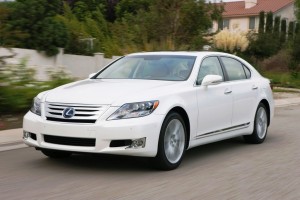Toyota Motor Sales in the U.S. will announce tomorrow that Japanese executives will order the recall of the most expensive 2010 model LS 460, 460L, LS 600h L Lexus sedans because of defective power steering.
This latest electronic calibration or control defect is being announced as James E. Lentz, President and Chief Operating Officer, Toyota Motor Sales, U.S.A., today told the House Committee on Energy and Commerce Subcommittee on Oversight and Investigations that “Toyota’s ETCS-i (electronic engine control computer) has been subjected to comprehensive testing over more than a decade without a single unintended acceleration event. Toyota has never discovered or been provided with any evidence that the ETCS-i can cause unintended acceleration in a real world scenario.”
U.S. sales executives do not have the authority to order a recall, and previous illegal delays in fixing a known safety defect by the offshore Japanese in charge of Toyota engineering and manufacturing resulted in a record fine of more than $16 million from the National Highway Traffic Safety Administration. Other Toyota safety recall delays are still under investigation at NHTSA. Both civil and criminal penalties are possible.
On the Lexus sedans in question with optional Variable Gear Ratio Steering (VGRS), the steering wheel may stick 90-degrees off center during aggressive maneuvering. It is the latest of a growing list of quality and safety defects at the Japanese sales leader.
This safety related defect occurs after driving from a tight turn where the steering was at the end of its travel (full lock to the left or right). VGRS “automatically” corrects the steering wheel off-center condition as the vehicle is driven within one to three seconds. Toyota said, “The driver may notice this condition as the steering wheel slowly moves to the center position while driving straight during the VGRS correction.”
A trend is emerging at Toyota and other makers: The electronic controls and the computer programs that now run everything from engine speed and output, transmission shift points, electronic stability controls and antilock brakes, among other systems, are not defect free.
While this is probably not new, what has changed is increased scrutiny from NHTSA; an agency that critics say ignored numerous Toyota safety problems, but is now being more diligent.
Toyota will replace the control computer on the affected vehicles. The problem occurred after it changed the programming on 2010 models.


I have a 2010 Camery that took a right turn on It’s own could this be the same kind of problem.
Help Megan
Hi, Megan,
I will ask other tech experts among our readers to weigh in, but I do NOT believe that you would experience the problem that is plaguing the Lexus models involved in the recall. Let me quote a critical paragraph from the report on TheDetroitBureau.com:
“…On the Lexus sedans in question with optional Variable Gear Ratio Steering (VGRS), the steering wheel may stick 90-degrees off center during aggressive maneuvering….”
To the best of my knowledge, the VGRS system is not in use on any versions of the ’10 Camry.
There have been concerns about steering-related issues with Corolla and other products, but not to the degree you describe. We’d be interested in hearing more details about what you experienced, the road conditions, etc. Have you checked the inflation of your tires? That’s a long shot, but it’s worth looking at. What did your dealer say? And have you experienced anything like this more than once?
Paul A. Eisenstein
Publisher, TheDetroitBureau.com
Hi I was traveling up a slight incline about 200 feet from a stop light at about 20-25mph when all of a sudden the car made a right turn over the curb and on to the side walk.The power steering need not work took all my strength to pull the wheel back.
Megan
Hi, Megan,
I am at a loss to explain a problem like this. Did you check tires? Did one wheel hit a large pothole? What did the dealer say (if you brought it in)? If you have not yet reported this to the NHTSA complaint line I’d strongly suggest doing so at DOT.GOV.
Paul A. Eisenstein
Publisher, TheDetroitBureau.com
Hi Reported to NTSB all they do is give it a number attached to VIN.Also reported it to Toyota they are sending someone out to look at the car in the next 2 weeks. Nothing wrong with the road the right front tire has more wear then it should.
The VGRS system control computer that is being recalled is not used on any other Lexus or Toyota models sold in the U.S., according to Toyota.